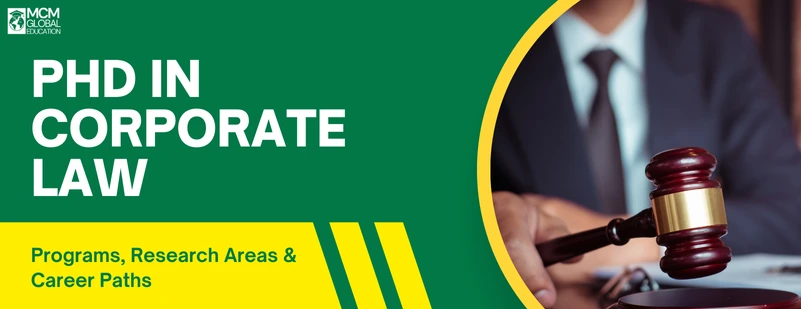Are you considering a PhD in Corporate Law? This advanced degree is the pinnacle of academic achievement for those interested in corporate governance, financial regulation, mergers and acquisitions, compliance, and sustainability in business law. A PhD in Corporate Law is ideal for aspiring academics, policymakers, and senior legal professionals who want to shape corporate legislation and governance at a global scale.
In this comprehensive guide, we’ll cover everything you need to know about a doctorate in corporate law—including admission requirements, top research areas, dissertation topics, program structure, and career paths.
Table of Contents
What is a PhD in Corporate Law?
A PhD in Corporate Law is a research-intensive doctoral degree that focuses on the study of corporate governance, finance, regulation, compliance, and global legal systems governing corporations.
- Degree types: PhD, DPhil, or SJD (Doctor of Juridical Science) depending on the country.
- Duration: Typically 3–5 years, depending on whether you pursue it full-time or part-time.
- Core components:
- Advanced coursework in corporate law theory and comparative legal systems
- Comprehensive exams
- Dissertation research and defense
This program goes far beyond a master’s degree (LLM) by requiring original contributions to legal scholarship.
Admission Requirements for PhD in Corporate Law
Getting into a PhD in Corporate Law program requires strong academic credentials and a well-defined research proposal. Here are the typical requirements:
| Requirement | Details |
|---|---|
| Educational Background | LLM or equivalent postgraduate degree in law |
| Academic Record | Strong GPA, preferably with a published thesis |
| Research Proposal | A detailed plan outlining your intended research in corporate law |
| Other Documents | Statement of Purpose (SOP), CV, letters of recommendation |
| Additional Requirements | Some universities may require GRE/LSAT scores or writing samples |
| Language Proficiency | IELTS/TOEFL for non-native English speakers |
Coursework and Skill Development
While the PhD is research-focused, most programs include coursework in the first 1–2 years.
Common PhD Coursework in Corporate Law:
- Corporate Governance and Regulation
- Comparative Corporate Law
- Advanced Legal Research Methods
- Corporate Finance and Securities Law
- Ethics and Compliance in Business Law
- Interdisciplinary Modules (economics, political science, behavioral studies)
Skills Developed:
- Legal research and academic writing
- Comparative analysis of corporate frameworks
- Critical thinking and policy evaluation
- Teaching and academic presentation
Key Research Areas in a PhD in Corporate Law
When pursuing a PhD in Corporate Law, students can specialize in various emerging and traditional fields. Below are the most sought-after research areas:
| Research Area | Focus Topics |
|---|---|
| Corporate Governance | Board structures, shareholder rights, ESG compliance, diversity in leadership |
| Mergers & Acquisitions (M&A) | Cross-border M&A, anti-takeover laws, hostile bids, regulatory challenges |
| Corporate Social Responsibility (CSR) | CSR legal frameworks, environmental accountability, human rights |
| Corporate Finance & Insolvency | Insider trading, securities regulation, bankruptcy law reforms |
| Technology & Law | Blockchain in governance, AI in decision-making, data protection |
| Compliance & Risk Management | Whistleblower protection, anti-corruption frameworks, LGRC (Legal Governance, Risk & Compliance) |
| Dispute Resolution | Corporate arbitration, shareholder litigation, class actions |
| Comparative & Behavioral Law | Corporate law differences across jurisdictions, behavioral economics in governance |
Examples of Dissertation Topics in Corporate Law
Here are some popular PhD dissertation topics in corporate law, organized by domain:
| Category | Sample Topics |
|---|---|
| Corporate Governance | “The role of ESG in shaping corporate board responsibilities” |
| M&A and Restructuring | “Cross-border mergers: Challenges of harmonizing corporate laws” |
| CSR & Sustainability | “Legal frameworks for corporate climate responsibility” |
| Finance & Securities | “Reforming insider trading laws in emerging economies” |
| Technology & Law | “Blockchain and corporate compliance: A comparative study” |
| Risk & Compliance | “Effectiveness of whistleblower protection in multinational corporations” |
| Dispute Resolution | “Shareholder arbitration vs litigation: A global perspective” |
| Comparative Law | “Corporate governance models: UK vs US vs EU” |
Program Structure & Timeline
Most PhD in Corporate Law programs follow a structured timeline:
| Year | Focus |
|---|---|
| Year 1 | Coursework in corporate law theory, research methods |
| Year 2 | Comprehensive exams, dissertation proposal defense |
| Year 3 | Data collection, legal research, writing chapters |
| Year 4–5 | Dissertation completion, publications, defense, academic job applications |
Career Opportunities After a PhD in Corporate Law
Graduates with a PhD in Corporate Law can pursue high-level careers across academia, government, and the corporate sector.
Career Paths:
- Academia – Law professor, legal researcher, academic author.
- Corporate Counsel – Senior legal adviser for multinational corporations.
- Regulatory Bodies – Roles in securities commissions, financial regulators, government policy think tanks.
- NGOs & International Organizations – Advising on CSR, sustainability, and human rights.
- Consultancy & Compliance – Risk management and legal governance consulting.
Emerging Trends in Corporate Law Research
The future of corporate law is being shaped by several new trends:
- AI and Legal Decision-Making – How artificial intelligence is influencing compliance and corporate governance.
- Sustainable Corporate Practices – ESG and climate-related accountability frameworks.
- Digital Corporate Governance – Shareholder meetings via blockchain and virtual platforms.
- Behavioral Insights – Applying behavioral economics to corporate governance laws.
Frequently Asked Questions (FAQs)
How long does it take to complete a PhD in Corporate Law?
Typically 3–5 years, depending on the program and research scope.
Do I need an LLM to apply for a PhD in Corporate Law?
Yes, most universities require an LLM or equivalent postgraduate degree.
What’s the difference between an LLM and a PhD in Corporate Law?
An LLM is a taught degree for professional specialization, while a PhD is research-intensive and focuses on creating new legal scholarship.
Can I do a part-time or online PhD in Corporate Law?
Some universities offer part-time or hybrid options, though most are campus-based.
What are the career prospects?
Graduates often work in academia, policy development, corporate governance, and international law firms.
Conclusion
Pursuing a PhD in Corporate Law is a challenging but rewarding path. It allows you to make an original contribution to legal scholarship, influence corporate regulation, and open doors to academic, policy, and high-level corporate careers. Whether your focus is on corporate governance, CSR, mergers and acquisitions, or compliance, this degree equips you with the expertise to become a thought leader in corporate law.
If you’re passionate about shaping the future of corporate law, a PhD is your ultimate next step.























